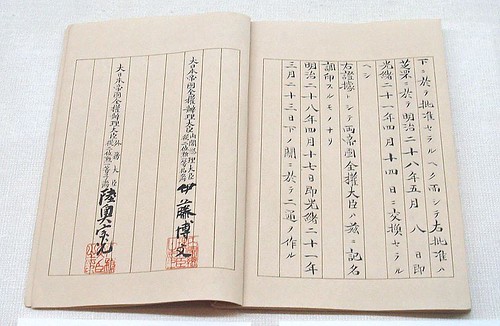
這幾天終於把這部分整理好了。刪除了原先一堆書寫,現在可以改寫引用了。
China’s Peiyang Fleet provoked a flurry of concern over “the naval superiority of the Qing” (Gluck 1985:131). Even on the eve of the Sino-Japanese War, the Military Commander of the Navy remained hesitant about going to war, given the consideration as depicted above. In July of 1893, a new Military Commander of the Navy was appointed, and Japan was ready for the war against China. Japanese writer Ubukata Toshirū, who lived in Meiji-Showa era, explains, “Till the war began, we still did not see the Chinese as negative ‘citizens’” (1978:33). During the war period, however, the public statements of schoolteachers and local speakers, as well as the sentiments published in journals, showed serious contempt for the Chinese. “Woodblock prints, war songs, magic-lantern shows, and New Year’s games raised the stock of the Japanese by denigrating their enemy,” writes Carol Gluck, “Casting the war as a conflict between civilization and barbarism, minkan [civilian] ideologues praised the level of Japan’s civilization, while even in popular song China became the ‘enemy of civilization,’ against which Japan fought a ‘righteous war’” (1985:135-6). The situation between Japan and China was a tinderbox in the late 19th century; a struggle for control of Korea provided the spark necessary to ignite that tinderbox. The Sino-Japanese Convention (1885) provided for mutual troop withdrawals and advance notification when taking new military actions in Korea. In 1894 a farmers’ revolt exploded in Korea, and China was asked for help to suppress the insurrection. Japan was notified as specified in the Convention and decided to send troops as well in order to “protect embassy, consulate and immigrants.” However, soon after the Chinese troops had arrived on the Peninsula, the rebels, cowed by the magnitude of the interventions by the two larger nations, signed an agreement with the Korean government that extracted promises of domestic reforms. The Chinese troops prepared to withdraw, and Japan’s forces on the Peninsula no longer had a valid reason for being there. However, Japan refused to withdraw its troops and furthermore induced the Korean court to abrogate its agreement with China. Japan’s Foreign Minister Mutsu Munemitsu expressed that “we [the Japanese] are already ‘riding the tiger’; we cannot change the levels of troops mid-ride.”
“By the 1890s, after seeing China suffer a new series of defeats at the hands of the French and the Russians,” describes Duus, “the military high command had become confident it too could win a war with the Chinese” (1995:22). As a result, the Japanese army was portrayed as having won “an absolute victory.” Such expectation was even much exceeded while the navy sweepingly defeated over the Peiyang Fleet, which a Japanese scholar writes, “brought on a radical reassessment of security needs by navy leaders” (cf. Jansen 1984:68): In mid-September, when both armies had been in combat for more than a month, the Peiyang Fleet eventually met the Japanese fleet in the Yellow Sea. The Peiyang Fleet suffered a crushing defeat and retreated hastily to its military port. By October the Japanese navy completely controlled the sea area between two countries. In February of 1895 both navies met again, and the Ting-Yue was hit by at least one torpedo on February 4. Five days later the Ting-Yue sank under heavy gunfire. On February 12th, Ding Yuchang, the Admiral of the Peiyang Fleet, committed suicide, and on 17th the devastated Chen-Yuen surrendered to the Japanese navy along with nine other warships. The 1895 Treaty of Shimonoseki, in the aftermath of China’s defeat, eventually concluded the Sino-Japanese War. Under a subsidiary commercial treaty (1896), China yielded to Japanese nationals the right to open factories and engage in manufacturing in the trade ports. This right was automatically extended to the Western maritime powers under the most-favored-nation clause.
In the meantime, during the second half of the nineteenth century, the Western powers developed the so-called “Co-operative Policy” with respect to China. The Co-operative Policy was “implicit in the expressed attitudes of leading diplomats and given credence by their official deeds,” which as Leonard Gordon remarks, refers to a “Gentlemen’s Agreement” among the Western powers that permitted them to “extract commercial privileges from China,” but would not permit them “the luxury of obtaining territorial concessions or allow others to do so” (1970b:94). The aim of the policy was to maintain “equal commercial opportunity for all interested powers,” which signifies an attempt at “conciliation” with China by “respecting China’s sovereign rights as a nation, mindful of her sensitivities and cultural distinctiveness, and, above all, to condemn force as an instrument of diplomacy” (ibid). The Policy therefore was not simply “a plan for the preservation of commercial opportunity but was equally significant as a scheme to preserve the territorial integrity of China” (Gordon 1970b:96).
Hence, when the 1895 Treaty of Shimonoseki declared Korea independent and provided for the cession of the Liaodong peninsula, the Pescadores, and Taiwan by Qing China to Japan, the Co-operative Policy was undermined, which made European powers sense the potential threat of a powerful Japan for the first time. Russia, Germany, and France staged the “Triple Intervention,” a successful diplomatic move that compelled Japan to retrocede the Liaotung peninsula to China on May 10. This interference in turn implicitly gave Japan international guarantees on its control over Taiwan. According to Gordon (1970b:108-9), Russia, in hopes of diverting Japan’s territorial aspirations in Korea and the Liaotung Peninsula, in a sense, had let it be known that it would not interfere with Japan’s takeover of Taiwan. Meanwhile, the focus of British commercial interest had been shifting from China to Japan during the late nineteenth century, so China could no longer depend on Great Britain to guarantee her territorial integrity. The position of the U.S. was too weak to turn the tide; in the meantime, the Americans were starting to set their sights on colonial expansion in the Pacific themselves. In addition, France had been interested in the Pescadores. The Co-operative Policy thus came to a complete end, leaving Taiwan vulnerable to seizure.
沒有留言:
張貼留言